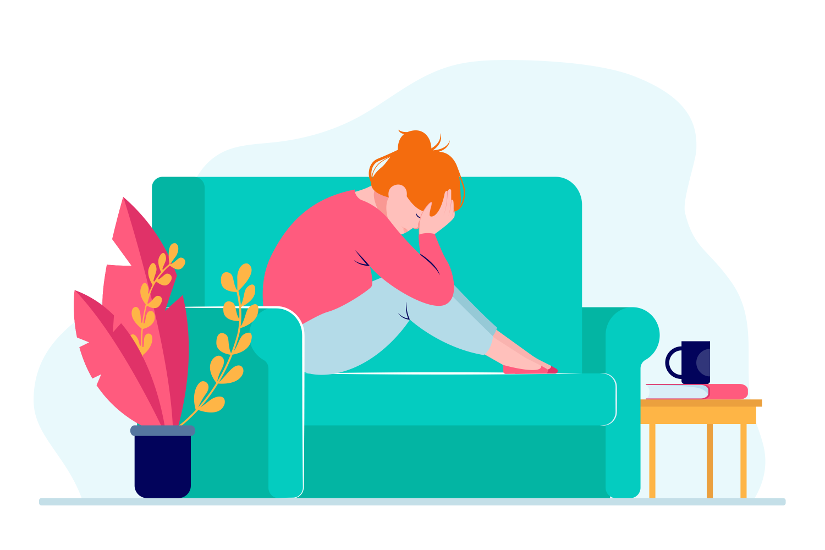
Woman vector created by pch.vector - www.freepik.com
We’re all dealing with it, together. And I know what you’re feeling so I don’t feel the need to again “label” those feelings. But the truth is, we just can’t evade feeling them too, can we? They’re in our mind, our heart, all around us. Even if we don’t feel it, our senses are quick enough to catch those vibes from hearing the news or reading the papers.
There seems just no escape from the war here - neither from the one outside nor the one we’re fighting in our minds - grappling with negative emotions of all sorts. So does that mean that we’re now stuck and we’d have to keep feeling the same way until God knows when?
Well, there’s another truth here which can’t be evaded either. Staying sane is the need of the hour. Our mental health is just as important as our physical one. For those of us who’re still lucky to have not been affected by the infection itself, there’s a dire need to protect your mind from falling into its trap.
A lot has been going on around in the social media circles and otherwise about the need to stay positive and strong. Yes, that is needed at the moment. But how? How does one stay positive in the middle of grieving over the loss of a loved one? Or how do we stay strong knowing that the virus is just around the corner and who knows we could be the next target?
It isn’t easy, understandably. But fearing the unknown is not going to help either, is it? So let’s talk real. We all need to stay sane. We need to protect our minds from dwelling, rather drowning, into unwanted thoughts. And it’s not going to happen naturally until we do something about it.
So here I share 5 quick tips that I’ve been following since the past few months, trying to maintain my sanity in these troubled times.
5 Tips to Help Keep Your Mind Off COVID Stress and Anxiety
1. Keep doing something. Cleaning done? Pick up deep-cleaning
For those of us staying home in the current lockdown situation which has again been imposed following the second wave of COVID, it gets even more difficult to not be affected by what’s going around. Especially so if you’re not working (I mean office work here). It’s only natural for the mind to start digressing and dwelling over something for unusually longer.
When you’re home without work as in now, pick up something to do. And yes, please avoid over-consuming the mind with news from the papers, television, or social media. Pick up something physical to do - cleaning the house, for example. We women are already doing that, yet I’ve noticed that even when we’re cleaning, doing the dishes, laundry, or cooking, our mind isn’t at rest.
And so I suggest deep-cleaning - some activity that’s going to take more of your physical or mental energy than what you’re usually spending at doing your normal household chores. It could be clearing up your wardrobe, re-arranging the kitchen cabinets, polishing the cutlery, tilling and mowing the lawn, just about any task that you may not usually think of picking up on a normal day of the week (tasks which we love to keep postponing until later).
If you have a list of any such tasks, now is the time to take a glance at it and indulge yourself in ticking off at least one from that list. The more you keep yourself busy and hands-on at a task, the less you’d find the time or energy to ponder too much.
How does one stay positive in the middle of grieving over the loss of a loved one? How do we stay strong knowing that the virus is just around the corner and who knows we could be the next target?
2. Spend time with kids. They’re always joyful and full of hope
If you have little ones at home, consider yourself lucky. Whenever you’re feeling down and low, go sit with them. Even if you don’t feel like talking or playing with them, it’s okay. They’d do the rest, trust me. They have the power to change your mood in seconds!
If you have grown-up kids, it helps even then. Talk to them, ask them what’s going on in their life, share with them your fears and anxieties (if the child is old enough to understand those). Sometimes getting a child’s perspective on the world is really an eye-opener.
Spending time with your children will help refresh your mind and fill it with energy, love and hope.
RELATED: How to Introduce the Concept of Death to Your Child? Experts Suggest Start Early
3. Pick up a hobby; it’s therapeutic
It’s so very important in these times, more than ever. You don’t have to think of something big here. We’re talking just 30 minutes or 1 hour a day. Read a book, preferably one that makes you feel good and happy, not a newspaper or a research journal highlighting numbers and statistics. Read a motivational book, hear a podcast on an inspiring story, or even fiction - if it interests you.
Try your hand at art - coloring or doodle, sketching, painting, origami, embroidery. Did you know that coloring is highly therapeutic? I tried it with my kids one day when they were filling colors in their coloring book and it’s magical - almost meditative! There’s no other thought that trespasses your mind at the time. It’s just you, your coloring pen and the book.

Book photo created by wayhomestudio - www.freepik.com
4. Write a journal; penning down your emotions helps
It doesn’t have to be professional in any way. We’re talking about picking up a notepad and pen and just writing what you’re feeling. You can be as casual as you want - scribbling something quick sometimes even with a pencil, in abbreviations, short forms, and in any of your preferred languages.
The idea is just to let your heart open up and dole out your innermost feelings - fear, anxiety, grief - on to paper. If you’re not comfortable with the idea of manual writing, you can also use the Notepad facility on your mobile device.
And yes, one extremely helpful practice that has served me in the last 2 months is journaling what I feel grateful for every single day. So before I retire for the night, each day, I write down at least 5 things that I was thankful for that particular day. You could write as many as you want or even say them in your mind if you don’t wish to write them out.
The idea is to become mindful of all that you still have in your life and around you, and to shift focus away from all the lack.
5. Limit news consumption
It’s important to be aware of all that is happening; it makes us informed and be on our guard. But over-dwelling the mind or over-consuming news from different quarters is only going to make matters worse.
Yet, as I say this, it does not mean that we don’t need to stay connected to one another. Social media helps in doing just that. Stay connected to your loved ones. Ask about their well-being. Even if you hear sad news, assure them, console them. Be with them, for them. That’s needed. In fact, staying connected can help avoid feeling lonely or helpless in these times.
Wrap-up
We’re in this together and we need to sail through. Along with protecting our body from contracting the infection, we also need to protect our mind from drowning in feelings that can have a much longer impact on our health and lives, moving forward. These tips have helped me and I pray they help you too. Stay safe. Hoping for a brighter future.
YOU MIGHT ALSO LIKE: Lockdown Blues? How To Feel Good Staying At Home
(If you found the post helpful, please don’t keep it to yourself. Pass it around to someone you know who might gain from it. These tips are simple but extremely helpful and they can be a reminder to someone, helping them get back on track. If you’d like more such helpful posts in your inbox, please get your free subscription to the blog).
